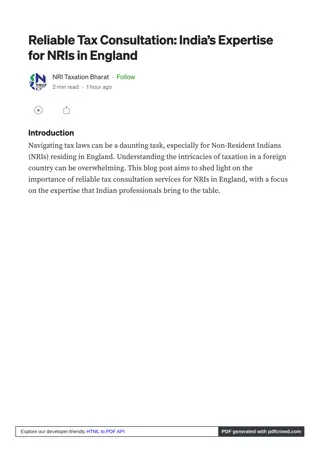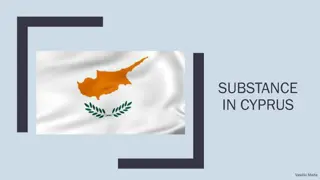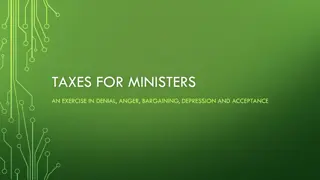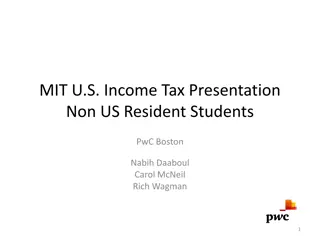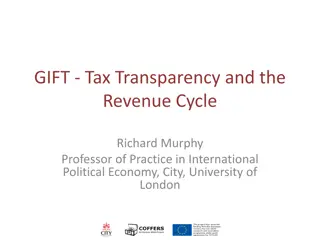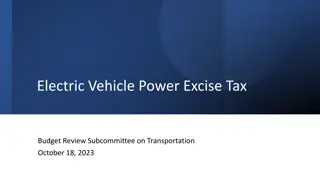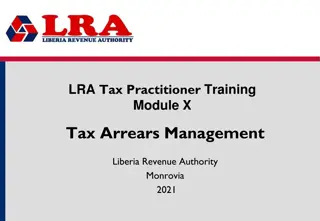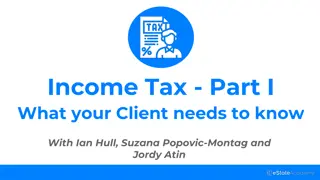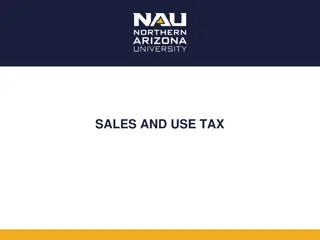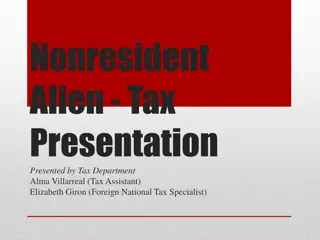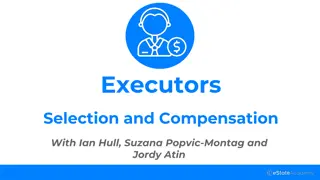Compensating Tax Rate in SPGEs
SPGEs, or Special Purpose Government Entities, must adhere to the compensating tax rate as per Kentucky Revised Statute 132.010. This rate ensures revenue stability from ad valorem taxes, with specific procedures for proposing, approving, or disapproving tax increases. Similar laws apply to fees, requiring notification and approval within set timelines. Explore the detailed guidelines governing tax and fee adjustments for SPGEs in Kentucky.
Download Presentation

Please find below an Image/Link to download the presentation.
The content on the website is provided AS IS for your information and personal use only. It may not be sold, licensed, or shared on other websites without obtaining consent from the author.If you encounter any issues during the download, it is possible that the publisher has removed the file from their server.
You are allowed to download the files provided on this website for personal or commercial use, subject to the condition that they are used lawfully. All files are the property of their respective owners.
The content on the website is provided AS IS for your information and personal use only. It may not be sold, licensed, or shared on other websites without obtaining consent from the author.
E N D
Presentation Transcript
KRS 65A.110 (Formerly HB 5) SPGEs and the Compensating Tax Rate
1. Applies to any ad valorem tax or fee by SPGE not otherwise required to be adopted or approved through an official act of an establishing entity. (SPGE could otherwise not act without approval.) 2. Exempted: Air Boards, Fire Protection Districts, Ambulance Taxing Districts. These are mentioned by the statutes used to form the SPGEs. The formation statute of each registered SPGE can be found on the Department for Local Government s (DLG s) website.
3. Compensating tax rate is defined in KRS 132.010 and applies to ALL SPGEs with the authority to levy ad valorem taxes. ( A rate which produces an amount of revenue approximately equal to that produced in the preceding year from real property.)
4. (a) All SPGEs not exempted by #2 above proposing an ad valorem tax increase above the compensating rate, or an ad valorem tax for the first time, must submit in writing the proposed rate to the establishing entity of that SPGE. This must be done within 7 days after the tax rate was adopted by the SPGE. Guidance is given as to which body shall be notified. (Generally, that will be the establishing entity or, if the SPGE serves more than one city/county, the city/county with the greatest number of citizens the SPGE serves.)
4. (b) The governing body then has 30 days to respond. The options are to: Approve the rate or fail to act Approve a rate lower than that proposed, but higher than the compensating rate. Approve a rate lower than that proposed on a new tax (After any of these, the rate may be implemented.) Disapprove the entire rate (If it is a previous levy, the SPGE may use a rate that does not exceed the compensating rate. If it is a new levy, the SPGE may not impose the levy and must wait 1 year before a new proposal.) An Excel spreadsheet is provided on the SPGE website https://kydlgweb.ky.gov/entities/16_SpgeHome.cfm.
5. (a) Similar laws apply to fees. In this case, new fees or an increase in fees that are expected to produce an increased revenue over the prior fiscal year must be submitted. The notification of such a proposed fee must be submitted no later than 45 days prior to the scheduled implementation of the fee.
5. (b) Again, the governing body has 30 days to respond. The options are to: Approve the fee or fail to act Approve a fee in an amount less than proposed (After either of these, the fee may be implemented.) Disapprove the entire fee (If it is a previous fee, any fee in existence shall remain unchanged, and the SPGE must wait 1 year to propose an increase. If it is a new fee, the SPGE must wait one year for a new proposal.)
6. Subsection 5 does not apply to 11 specified fees. Those are: (a) Rental fees; (b) Fees established by contractual arrangement; (c) Admission fees; (d) Fees or charges to recover costs incurred by a special purpose governmental entity for the connection, restoration, relocation, or discontinuation of any service requested by any person; (e) Any penalty, interest, sanction, or other fee or charge imposed by a special purpose governmental entity for a failure to pay a charge or fee, or for the violation or breach of or failure to pay or perform as agreed pursuant to a contractual agreement or as reflected in a published schedule; (f) Amounts charged to customers or contractual partners for nonessential services provided on a voluntary basis; (g) Fees or charges authorized under federal law that pursuant to federal law may not be regulated by the Commonwealth or local governments within the Commonwealth; sewage treatment provider; (h) Purchased water or sewage treatment adjustments, as authorized by KRS 278.015, made by a special purpose governmental entity as a direct result of a rate increase by its wholesale water supplier or wholesale sewage treatment provider: (i) Any new fee or fee increase for which a special purpose governmental entity must obtain prior approval from the Public Service Commission pursuant to KRS Chapter 278; (j) Other charges or fees imposed by a special purpose governmental entity for the provision of any service that is also available on the open market; or (k) Fees or charges imposed by municipal utilities for the provision of power, water, wastewater, natural gas, or telecommunications services, unless submission is otherwise required by statute or an ordinance adopted by the establishing entity.
Establishing entities may impose reporting or submission requirements that are more stringent than the above. Per KRS 132.023, SPGEs are required to hold public hearings for proposals for tax rates above the compensating rate. The portion of any rate above 4% the compensating rate shall also be subject to a recall vote if a proper petition is filed and signed by at least 10% of the registered and qualified voters of the affected jurisdiction.
Resources: KRS 65A.110 KRS 132.023 KyDLGWeb.ky.gov DLG-CSD@ky.gov
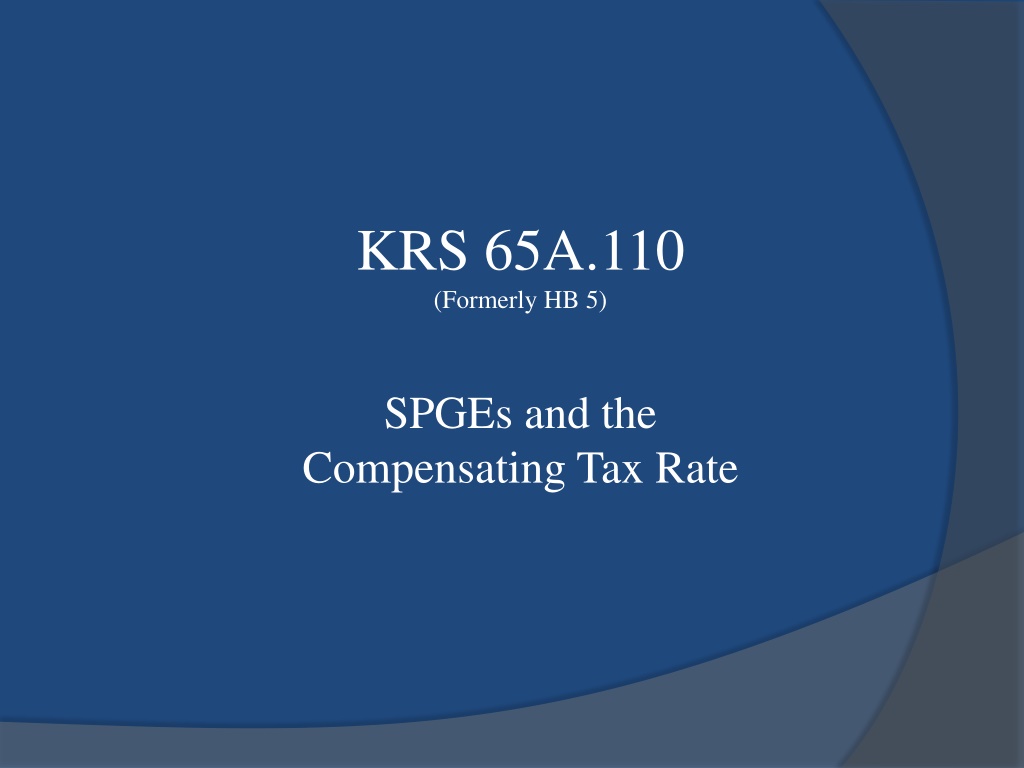



![Town of [Town Name] Real Estate Tax Rates and FY 2024 Budget Summary](/thumb/62211/town-of-town-name-real-estate-tax-rates-and-fy-2024-budget-summary.jpg)
